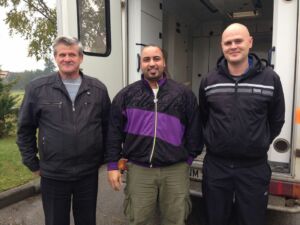News
How a transport company is making strides for the handicapped community
This article is more than 9 years old.
Handicap Team is committed to helping people with physical and mental disabilities to become more mobile

Jason El Falaki (centre) is working to create a world without boundaries
Handicap Team, a transport company dedicated to the needs of people with disabilities in the Greater Copenhagen area, is still in its infancy – that being said, it’s committed to big ideas and taking giant strides.
Started by 35-year-old Jason El Falaki, a Dane living in Sweden with roots in Morocco, in October 2014, Handicap Team has made the mobility of people with physical and mental disabilities its main
mission.
However, that is far from its only goal, and with its first big international humanitarian project in the pipeline, things are nicely on track
The Copenhagen Post Weekly sat down with El Falaki recently to learn more.
Tell us a little more about Handicap Team
I started Handicap Team in 2014 to offer a convenient transport service for people of all ages with physical and mental disabilities. I operate mostly in the Greater Copenhagen area and have tied up with municipalities who refer me to private individuals with special needs who need to be driven places – to doctors for check-ups, to stores, or just to get out of the house! A lot of these people live in places where disability-friendly public transport is sometimes hard to come by.
What made you want to start a service like this? It’s clearly something you’re passionate about
I started off with a really simple reason: everyone deserves mobility – to be able to live life without boundaries, so that there are no limits to what you can do. Physical and mental disabilities shouldn’t get in the way of you reaching your full potential.
Handicap Team is more than just a transportation company. Tell us a little bit about your other initiatives
We’ve tied up with youth networks all over Europe – like ESN and Lion’s Club, for example. We’ve also recently tied up with a centre for handicapped people in Lithuania and are working on an exciting project with them.
In Denmark, the resources available to accommodate people with special needs are vast – there’s equipment and know-how. The case isn’t the same in Lithuania.
When we visited the centre, we had a chance to see what equipment they were working with: their minibuses, for example, have no wheelchair hoists and the staff at the centre have to do everything manually. That takes a lot of effort and can be incredibly uncomfortable for the patients.
Therefore, in 2013 and again last October, we visited Šalčininkai and discussed the safety of the minibuses and decided to try to assist them in upgrading them in order to improve their motivation and independence.
But most importantly, they need equipment and we wanted to do something to help them. So we’re in talks with Lion’s Club to figure out ways to get second-hand equipment from Denmark to Lithuania. It’s expensive, but I have drivers and I’m willing to drive the equipment there myself.
It sounds like quite a project
Yes, and we’re also organising a festival in the summer: the Vilnius festival. The plan is to have people at the centre create handmade goods that we can then sell to raise money for equipment, and we’re all very excited. Hopefully, it’ll go well and the people who need help the most will be able to finally receive it.










































